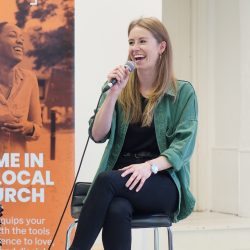
The Small Groups Big Mission workbook has landed and we’re seeing students across the UK receive training in leading missional small groups! The workbook asks the question, ‘what does it look like to host unmissable meetings? To lead a small group that people can’t wait to attend?’
The book and the training consists of 4 main sections, including creating small groups of real community, real faith, real creativity and real growth, and also provides a practical outline of how to host an unmissable small group! Based around the 4 Ws (welcome, worship, word and witness), the workbook provides you with an opportunity to think creatively around how to lead small group meetings.
In the last 2 weeks, we’ve looked at ideas of how to welcome well, as well as worship in a small groups context.
Next up: the word!
Hosting an unmissable small group means more than a social meet-up. With an abundance of societies to get involved with, our friends don’t need another social group. Unmissable small groups are founded on the Bible, on hearing from and interacting with God. But how do you do that with a group of students who vary so much in interest and knowledge of the Bible? Here are 6 tips to get the word more present in your small group that includes everyone!
1. ‘What does that mean to you?’
Read a Bible passage and pick one word in it that makes sense to everyone. Perhaps it’s ‘hope’, perhaps it’s ‘love’, perhaps it’s simply the name ‘Jesus’. Then, have a chat about what that word means to each person. Everyone in the room will know that there is no right or wrong answer and that their opinions, feelings and experiences are valid.
To one person, Jesus may be an idea they’ve never thought about, to others, a prophet, to others, Jesus may be God. This is one way to facilitate discussion around the Bible, regardless of people’s prior knowledge and understanding.
2. ‘What’s online?’
There are so many brilliant resources online that help you to read the Bible. My personal favourite is the Bible Project on Youtube. They create fantastic, informative and short videos about different parts of the Bible. This is a great way to summarise points in the Bible and start a discussion.
3. ‘Will you be in my group?’
Get into groups of 2-3 within the small group and read a text through together. Getting into smaller groups will help people to feel free to ask questions, to share their viewpoints or express their doubts. It also helps to ensure that the conversation in the room doesn’t go off on a tangent, which could happen in larger discussions.
4. ‘Who shall I be?’
Role play can be both a hilarious and informative way of remembering the Bible story. People may not remember every point in the story, but they will remember laughing with and at each other, as well as the message behind it.
5. ‘When can we get coffee?’
For many, the most helpful times to read the Bible will be outside of a small group context. This could look like meeting for coffee during a lunch break in the week to chat more about what was discussed at small group. This is particularly helpful for not-yet-Christians/new Christians to learn about stories in the Bible, and essential in helping them to have a Biblical foundation in their faith.
6. ‘What do can we learn from this?’
End by writing a summary of key points, challenges and changes needed after reading the passage. Make note of what has been said in a journal, and then hold each other accountable to the challenges. Creating challenges can be a fun way of enjoying Bible reading and encouraging others to do it!
These are just five ways of focusing on the word in a small group context. What are your ideas? Let us know by reaching out on Instagram @hellofusionmovement. We can’t wait to hear how you creatively welcome people in your small groups!






